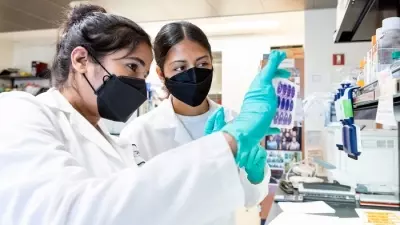
Antiviral treatment to stop Covid transmission developed by Indian-origin researcher
text_fieldsSan Francisco: A group of US researchers including Indian-origin research investigator Sonali Chaturvedi has created a single-dose intranasal medication that not only lessens the symptoms of several Covid types but also the virus's shedding.
The Gladstone Institutes team from San Francisco demonstrated in a recent study that this novel therapy, known as a therapeutic interfering particle (TIP), also reduces the amount of virus shed from sick animals and restricts viral transmission.
"To our knowledge, this is the only single-dose antiviral that reduces not only symptoms and severity of Covid-19, but also shedding of the virus," said Chaturvedi, first author of the paper.
Historically, it has been exceptionally challenging for antivirals and vaccines to limit the transmission of respiratory viruses, including SARS-CoV-2.
"This study shows that a single, intranasal dose of TIPs reduces the amount of virus transmitted, and protects animals that came into contact with that treated animal," said Gladstone senior investigator Leor Weinberger.
The benefit of TIPs, though, goes beyond their ability to stifle a virus inside infected cells.
Since TIPs reside inside the same cells as the virus they target, they evolve at the same time, staying active even as new viral strains emerge.
"Over the last few years, many of the challenges of the pandemic have been related to the emergence of new variants," said Chaturvedi.
"TIPs would be an ideal treatment because they keep learning as the virus evolves, so they could keep the problem of drug resistance in check," she noted.
In the new paper, Weinberger and Chaturvedi studied whether TIPs could also reduce viral shedding -- a separate question from reducing symptoms and viral load.
The researchers treated hamsters infected with Covid with the antiviral TIPs and then measured the amount of virus in the animals' noses daily.
The initial experiments were done using the Delta strain of SARS-CoV-2.
By day 5, all control animals were still shedding high levels of virus, while the virus was undetectable in four out of five TIP-treated animals.
When the infected animals were housed in cages with uninfected animals, treatment of the infected animals with TIPs did not fully prevent the transmission of Covid-19.
However, it did lead to significantly lower viral loads and milder symptoms of infection in the newly exposed animals.
Weinberger's team is now seeking FDA approval for a clinical trial to test the TIPs in humans.
"Being able to reduce SARS-CoV-2 transmission in this animal setting is quite promising for being able to reduce human-to-human transmission," said Weinberger from Gladstone, which has an academic affiliation with the University of California, San Francisco.
With inputs from IANS























